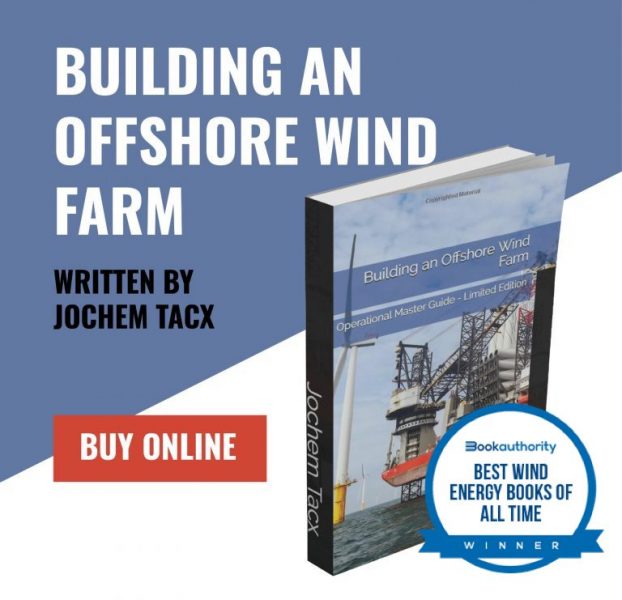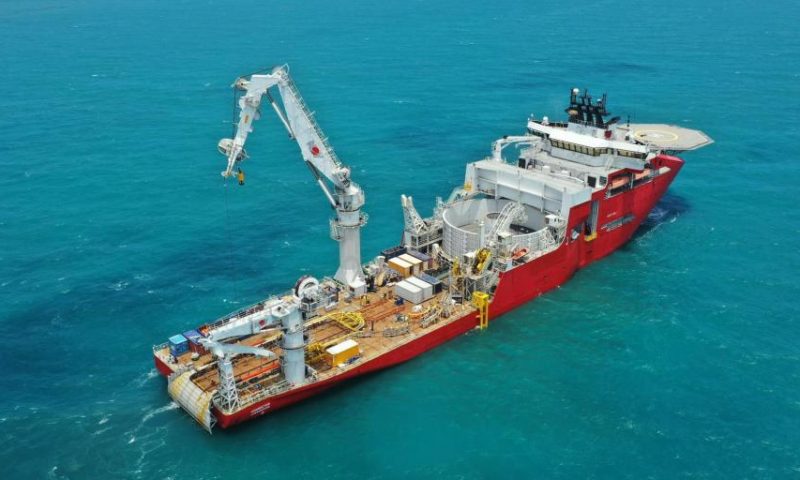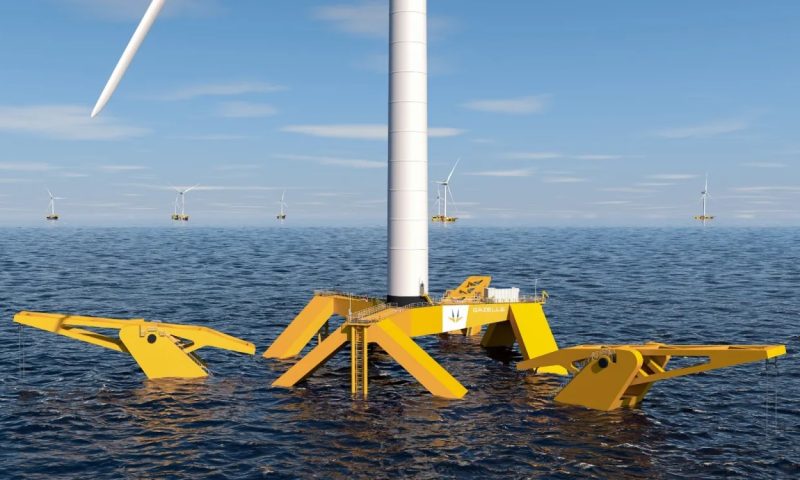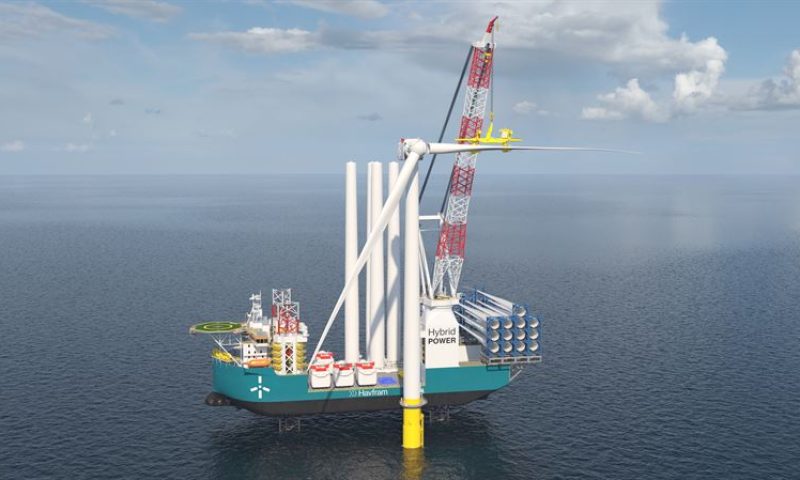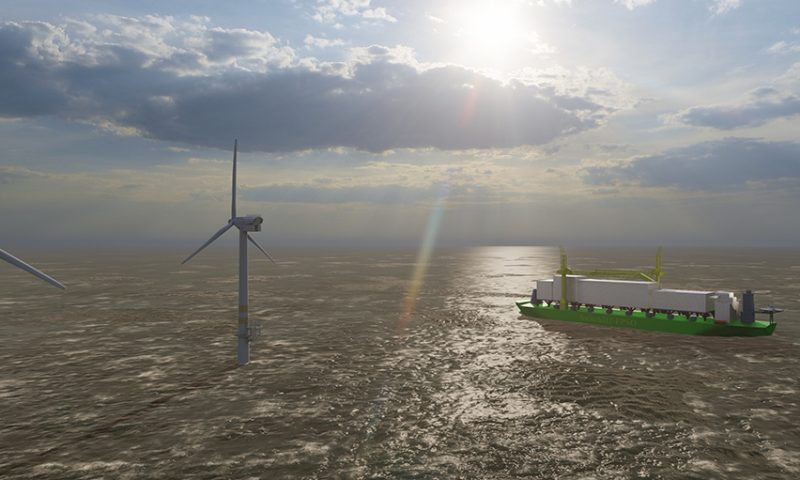
JAN DE NUL LAUNCHED THE WORLD’S TALLEST NEXT GENERATION JACK-UP INSTALLATION VESSEL VOLTAIRE
Designed in-house, and pushing engineering boundaries, Voltaire is built to transport, lift and install offshore wind turbines, transition pieces and foundations. The main crane with a capacity of over 3,000 tonnes will enable her to construct the current and future generation of wind farms at sea. Voltaire is ready for the future of offshore renewables, and will also be available to the oil and gas industry for the decommissioning of offshore structures.
The Voltaire is a jack-up vessel fitted with a high-tech jacking system. Four giant legs of 130 metres support the vessel to achieve stable working conditions at unsurpassed water depths up to 80 meters and with an elevated load of 16,000 tonnes.
Scaling-up to serve growing market demands
With the increasing demand for decarbonisation and lower-cost green electricity, offshore wind turbine and foundation components continue to rapidly increase in size to a point where their dimensions have largely outgrown the current market installation capability.
Jan De Nul Group has been preparing for the arrival of next generation offshore wind components and in 2019, announced the order of the Voltaire, the world’s tallest and highly advanced jack-up installation vessel, and Les Alizés, an equally revolutionary floating installation vessel.
With unrivalled lifting capacities of over 3,000 tonnes and 5,000 tonnes respectively, along with Jan De Nul’s existing subsea cable laying trio, these vessels will have the capability to install the complete requirements of next generation offshore wind. Today, it is clearer than ever that Jan De Nul made the right decision by ordering the Voltaire and Les Alizés in 2019.
Philippe Hutse, Director Offshore Division at Jan De Nul Group: “The Voltaire will enable us to work in deeper waters and reach ever higher nacelle heights than before. Adding Voltaire and Les Alizés to the fleet gives us the perfect set of vessels to execute the growing number of large and clustered international offshore wind projects. Our forward-looking view on market trends and the quick decision making to invest in this set of Next Gen installation vessels, have done us no harm. The Voltaire and Les Alizés have all the required specifications to meet the upcoming challenges in offshore renewables. We are proud to be recognised for the choices we made back in 2019, and look forward to continuing our journey, alongside industry leaders, through our contribution to renewable energy growth in the worldwide energy transition.”
The success of the Voltaire was demonstrated in 2020 with the award of her first assignment only one year after her order: she will mobilize to the United Kingdom for the construction of the 3.6 GW Dogger Bank offshore wind farm, the world’s largest offshore wind farm, transporting and installing in total 277 GE Haliade-X turbines up to 14MW. As such, the Voltaire will contribute to the largest offshore wind farm in the world, generating enough energy to power up to 6 million homes every year – around 5% of the UK’s electricity needs.
Steve Wilson, Dogger Bank Project Director: “We congratulate Jan De Nul on successfully launching its unrivalled Jack up Vessel, the Voltaire. This impressive installation vessel will play a critical role in the construction of all three phases of Dogger Bank Wind Farm when it enters service, demonstrating an innovative engineering solution to the growing challenge presented by larger and more technically demanding wind farms.”
Innovative design with safe and green technologies on board
The highly innovative main crane will be fitted with a Universal Quick Connector (UQC), developed by Huisman, and leveraging the expertise of Jan De Nul’s operational and engineering teams. The result is a ground-breaking innovative UQC, that will deliver a major step change in safer offshore lifting activities.
Compared to Jan De Nul’s other Jack-Up Vessel Vole au vent, this new vessel has almost double the deck space. Not only is this vessel capable of loading the next generation of wind turbines and foundations, the larger deck space will also enable Jan De Nul to optimize installations at sea and to lower fuel consumption and emissions. Furthermore, the Voltaire will be able to run on second-generation biodiesel that reduces the fuel carbon footprint by up to 90%.
In common with Les Alizés, the Voltaire is equipped with a highly advanced dual exhaust filter system, removing up to 99% of nanoparticles from emissions using a diesel particulate filter (DPF) and reducing the NOx emissions and other pollutants by means of a selective catalytic reduction system (SCR) to levels in accordance with EU Stage V regulation. Together, these vessels will be the first two seaworthy installation vessels in the world with an extremely low carbon footprint.

